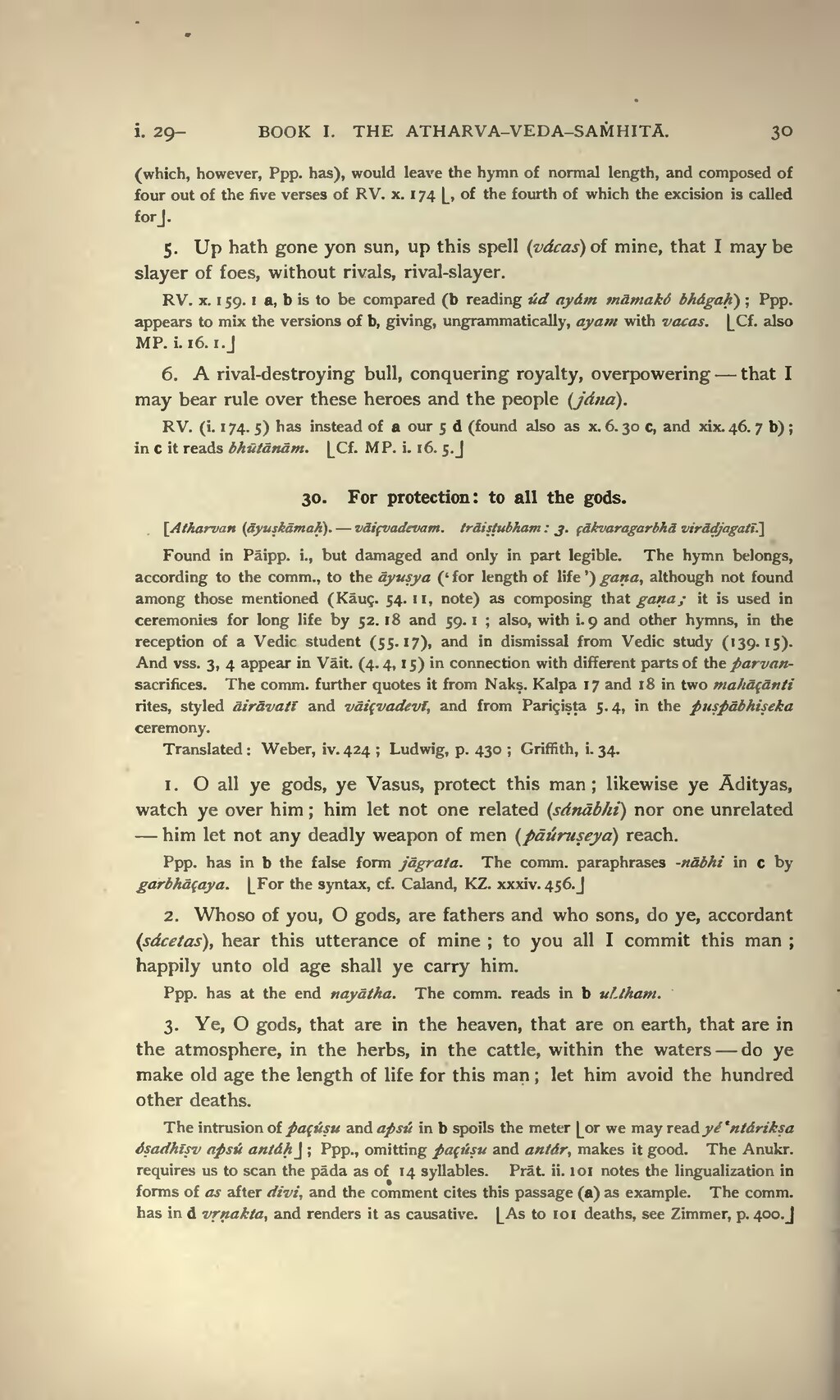5. Up hath gone yon sun, up this spell (vácas) of mine, that I may be slayer of foes, without rivals, rival-slayer.
RV. X. 159. 1 a, b is to be compared (b reading úd ayám māmakó bhágaḥ); Ppp. appears to mix the versions of b, giving, ungrammatically, ayam with vacas. ⌊Cf. also MP. i. 16. 5.⌋
6. A rival-destroying bull, conquering royalty, overpowering—that I may bear rule over these heroes and the people (jána).
RV. (i. 174. 5) has instead of a our 5 d (found also as x. 6. 30 c, and xix. 46. 7 b); in c it reads bhūtānām. ⌊Cf. MP. i. 16. 5.⌋
30. For protection: to all the gods.
[Atharvan (āyuṣkāmaḥ).—vāiçvadevam. trāiṣṭubham: 3. çākvaragarbhā virāḍjagatī.]
Found in Pāipp. i., but damaged and only in part legible. The hymn belongs, according to the comm., to the āyuṣya ('for length of life') gaṇa, although not found among those mentioned (Kāuç. 54. 11, note) as composing that gaṇa; it is used in ceremonies for long life by 52. 18 and 59. 1; also, with i. 9 and other hymns, in the reception of a Vedic student (55.17), and in dismissal from Vedic study (139. 15). And vss. 3, 4 appear in Vāit. (4. 4, 15) in connection with different parts of the parvan-sacrifices. The comm. further quotes it from Nakṣ. Kalpa 17 and 18 in two mahāçānti rites, styled āirāvatī and vāiçvadevī, and from Pariçiṣṭa 5. 4, in the puṣpābhiṣeka ceremony.
Translated: Weber, iv. 424; Ludwig, p. 430; Griffith, i. 34.
1. O all ye gods, ye Vasus, protect this man; likewise ye Ādityas, watch ye over him; him let not one related (sánābhi) nor one unrelated—him let not any deadly weapon of men (pāúruṣeya) reach.
Ppp. has in b the false form jāgrata. The comm. paraphrases -nābhi in c by garbhāçaya. ⌊For the syntax, cf. Caland, KZ. xxxiv. 456.⌋
2. Whoso of you, O gods, are fathers and who sons, do ye, accordant (sácetas), hear this utterance of mine; to you all I commit this man; happily unto old age shall ye carry him.
Ppp. has at the end nayātha. The comm. reads in b uttham.
3. Ye, O gods, that are in the heaven, that are on earth, that are in the atmosphere, in the herbs, in the cattle, within the waters—do ye make old age the length of life for this man; let him avoid the hundred other deaths.
The intrusion of paçúṣu and apsú in b spoils the meter ⌊or we may read yé 'ntárikṣa óṣadīṣv apsú antáḥ⌋; Ppp., omitting paçúṣu and antár, makes it good. The Anukr. requires us to scan the pāda as of 14 syllables. Prāt. ii. 101 notes the lingualization in forms of as after divi, and the comment cites this passage (a) as example. The comm. has in d vṛṇakta, and renders it as causative. ⌊As to 101 deaths, see Zimmer, p. 400.⌋
